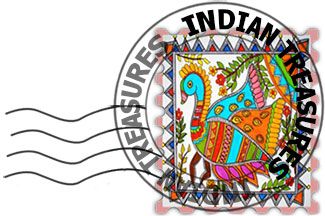The banyan tree and the green chilli; the crow and the beetle; the rose and the mango; the informality and good humour of its people...
Beloved author Ruskin Bond continues Rediff.com's special series on India's treasures, and tells Archana Masih that India's wealth lies in its earthy splendours.
Illustration: Dominic Xavier/Rediff.com

In India you will find almost every kind of fruit tree. The vast diversity of our plant life is our great treasure.
Forest trees, wild plants, fruits... from coconuts to apricots to peaches, they are all here.
Of course, there are some 100 kinds of mangoes. One could have a long debate on that and it would be more friendlier and entertaining that what we hear on TV (laughs).
Among the trees, I love the old banyan tree.
As a boy I used to wander between those aerial branches. One of my earlier stories was called 'Adventures in a Banyan Tree'.
We are still largely a very agricultural country. You can grow almost everything here.
In Ayurvedic medicine they say for every disease or ailment there is a plant that will yield an appropriate medicine.
We have so many flowers too. There are many flowers from my childhood that I don't see anymore.
Come October, the hills would be ablaze with cosmos that would run wild. It was my favourite. Up to ten years back, you could find the cosmos everywhere. Oddly enough I can't find it anymore.
Wild irises would bloom in the spring. I haven't seen that for sometime.
I like flowers that have a fragrance like the sweet pea and roses. Down south there is the jasmine, of course. I believe bees worldwide are on their way out which would be disastrous for pollination.
Some insects have vanished too. The beetles were so common, there used to be such a variety of them in the monsoon. They would fly in through the windows -- Stag beetles, Rhino beetles, Bamboo beetles -- you don't see them anymore.
They say the sparrows have gone. I saw a little sparrow the other day. It looked very undersized. Maybe the few that have survived have shrunk. Maybe we'll shrink too as human beings (laughs), but they say the human race is getting taller.
Our legs are definitely going to get shorter because we do not walk enough (laughs).

Certain birds are also hard to see. There is a friendly crow who comes to sit at my window.
Herbs, plants and forest wealth is diminishing and we don't appreciate it enough.
We could lose this if we are not careful because there is more importance given to urbanisation -- a lot of the wilderness is being lost.
In the Doon Valley, rice cultivation has reduced, litchi trees have diminished, guava trees have gone altogether.
I remember as a young boy going with friends into the sugarcane fields to steal ganna and getting chased out.
The Doon Valley has been urbanised with buildings and flats. My grandparents had a small bungalow, it's not in the family anymore, but there are 20, 30 buildings in that compound now.
I like quiet places or neglected towns. A couple of years back I discovered a little seaside resort on the East coast -- Gopalpur on Sea. It has miles and miles of beach and a few fishermen.
I remember right up to the 1970s, everybody drank tap water in their homes, railways platforms etc. It was not considered dangerous as it is now. Now everyone drinks filtered, boiled or bottled water.
In Delhi as a boy I used to keep tap water in a surahi to keep it cool in the summer.
The longest train journey I took was from Dehradun to Bombay by a passenger train. I remember a myna bird got into the compartment in Haridwar and it couldn't get out till Baroda. I don't know if it got home again or became a refugee.
The biggest change I have seen is cars. There were three cars when I came to live here in Landour in 1964. Now there are 300 taxis, if not more, leave alone the private cars.
This is representative of the other big change -- the prosperous middle class which has led to more private schools maybe to the detriment of Hindi and regional language schools.
The tremendous variety in its people is what makes India unique.
Variety in its languages, culture, literature, music, arts -- there is a lot of richness.
At times it is overcrowded and chaotic, but nevertheless things seem to work out eventually. Solutions are found.
I find tremendous goodwill although you find instances of conflict. But by and large there is a good amount of give and take.
Those who have to struggle for a living get on much better with each other than those who have nothing else to do.
There is good humour too between people in difficult situations.
I left India to make a life in England, but returned because of sentimental reasons.
I missed my friends, Dehradun, the old banyan trees which you wouldn't see in England, also the informality of India. It is so monotonous in England or Europe.
This is as true now as it was then, in spite of the cars (laughs).
India's food is another wonderful treasure.
The most important food item in the country is the green chilli. You can't really have a tasty dish without it.
I can't emulate my mother, but she used to eat green chillies plain, said they were good for the eyesight.
You can't imagine Indian food without chillies -- whether vegetarian or non vegetarian. I like good north Indian food like a good mutton kofta. I also like bread and butter, jam, marmalade, sardines on toast.
Ruskin Bond is one of India's most popular writers. He has received the Padma Shri, Padma Bhushan and Sahitya Akademi awards.
Earlier in the series:
Indian Treasures logo designed by Rajesh Karkera/Rediff.com






 © 2025
© 2025